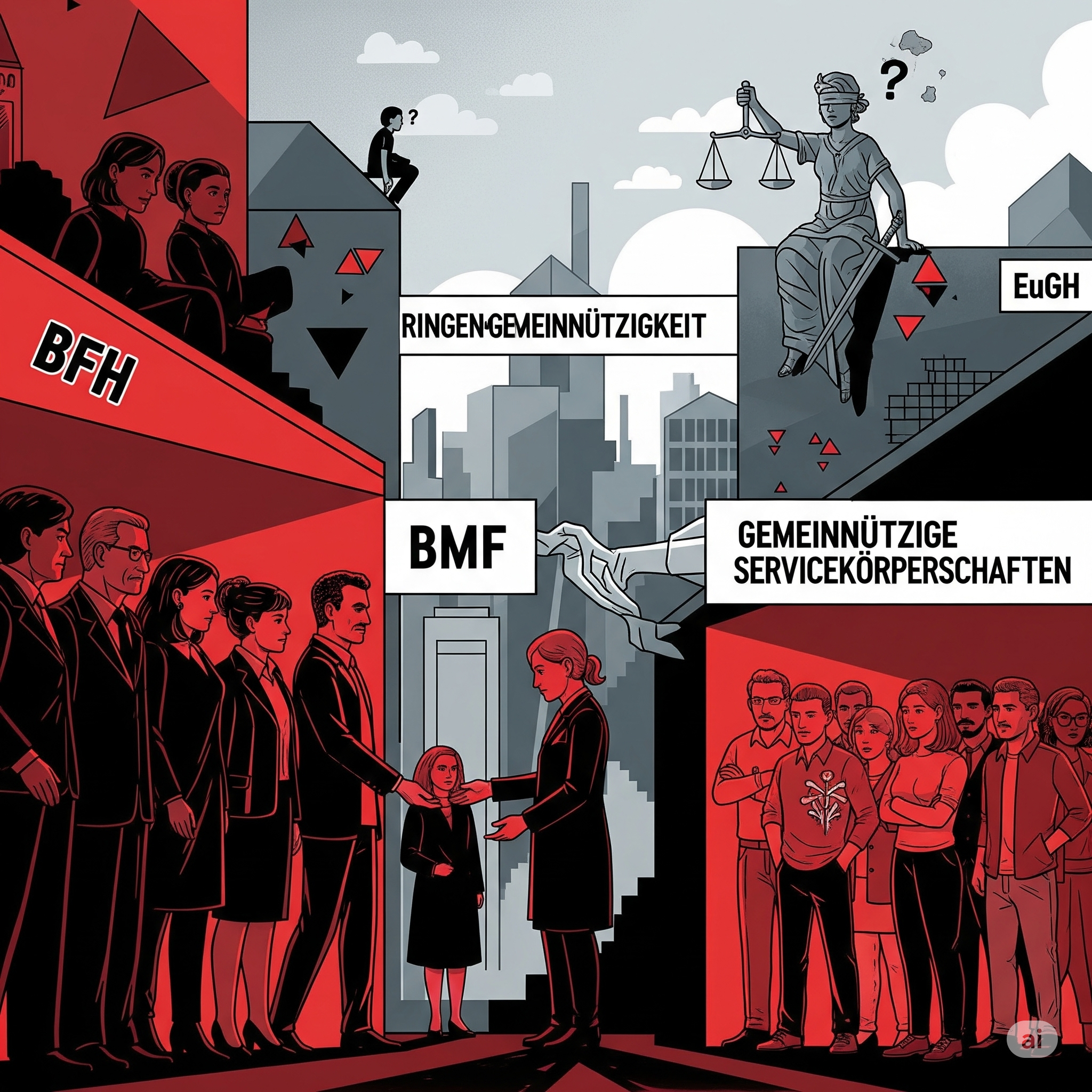German tax advantages for non-profit service organisations under threat?
Federal Fiscal Court refers questions on the non-profit status of service organisations to the ECJ
A recent question referred to the ECJ by the Federal Fiscal Court on 22 May 2025 (V R 22/23) could have far-reaching consequences for many non-profit organisations in Germany. Essentially, the question is whether tax breaks for so-called service corporations are to be classified as illegal state aid under Art. 107 (1) TFEU. An affirmative answer could result in the inapplicability of Sec. 57 (3) of the German Fiscal Code (AO).
Background: Tax breaks for non-profit service organisations
Non-profit organisations in Germany enjoy extensive tax exemptions, including exemptions from corporation tax (Körperschaftsteuer) and trade tax (Gewerbesteuer), as well as a reduced VAT rate of seven percent for services rendered by those organisations. Traditionally, those benefits are subject to the so-called “immediacy requirement” under Sec. 57 (1) AO: The organisation itself must implement the tax-privileged purposes directly.
The Annual Tax Act 2020 (JStG 2020) has extended this provision. Under Sec. 57 (3) sentence 1 AO, organisations may also pursue their tax-privileged purposes through planned cooperation with another non-profit corporation. The aim was to facilitate cooperation and reduce taxation on the outsourcing of services.
Procedural Background
The underlying dispute for the referral to the ECJ is the case of a limited liability company (GmbH) founded in 2022 that was supposed to provide financial accounting services for a charitable foundation. According to their statutes, both entities pursued the same charitable purposes through planned cooperation.
The tax authorities initially recognised the charitable status of the limited liability company but later revoked the recognition based on the fact that cooperation was not mentioned in the foundation's statutes – pursuant to the “double statutory requirement” that tax authorities were required to apply. The Fiscal Court (Finanzgericht) upheld the GmbH's action, whereupon the tax authority lodged an appeal.
In the appeal proceedings, the Federal Ministry of Finance (BMF) confirmed that Sec. 57 (3) AO had not been notified to the European Commission. The BMF argued that a notification was not required as no state aid was present due to the fact that non-profit organisations are in a situation not comparable with the situation of for-profit companies. The BMF also argued that Sec. 57 (3) AO does not alter the existing concept of non-profit status.

Key questions referred to the ECJ
The Federal Fiscal Court has suspended the appeal proceedings and referred three questions to the ECJ for a preliminary ruling:
- Aid for non-profit service organisations? Is there state aid present if a non-profit service organisation is entitled to tax advantages for an economic activity even though it does not implement its objectives directly itself but through cooperation and is therefore in competition with other service providers?
- Selective advantage despite restrictions? Do restrictions under non-profit law (use of funds, asset restrictions) preclude a selective advantage?
- Altering of existing aid? If aid is affirmed: Is there a notifiable altering of existing aid if national law already provided for tax relief for special-purpose enterprises before 1 January 1958, but the scope of application was subsequently extended?
The BFH's assessment: Presence of state aid
The BFH is of the opinion that Sec. 57 (3) AO entails an advantage (tax exemptions/reductions) to undertakings attributable to a state measure. It also sees a potential impairment of trade between Member States and a distortion of competition, as non-profit service organisations can offer "marketable" services in competition to ordinary ecnomic operators. This also applies to VAT reductions, for which the BFH notes that the German legislature has exceeded its discretionary powers in this regard when transposing the relevant EU directive.
With regard to selectivity, the BFH found that the preferential treatment of non-profit organisations already constitutes a selective advantage. Irrespective of this, according to the BFH, Sec. 57 (3) AO leads to an exception within the regulations for tax-privileged entities that discriminates between privileged and non-privileged companies in the same legal and factual situation. The BHF argued that there is no apparent justification for such discrimination.
The BFH also rejected the argument that state aid was not present as the general public benefits from the activities of the non-profit organisations. According to the BFH, the restrictions on the use of funds did not preclude selectivity either, as the extended catalogue of charitable purposes allowed for far-reaching distortions of competiton.
Finally, the BFH hold that Sec. 57 (3) AO constituted new aid, as it was not merely a clarification, but entailed a significant extension of the group of beneficiaries.
Outlook: Far-reaching implications for non-profit law
The outcome of the proceedings before the ECJ is uncertain, as the BFH's reasoning on the selectivity of the measure is controversial. In particular, the determination of the relevant reference framework could be assessed differently by the ECJ, as Member States have, in any case, tax autonomy in the area of direct taxation, which also includes the creation of tax exemptions for public welfare purposes. It is also questionable whether organisations that pursue charitable purposes in cooperation with each other can be regarded as a “coherent category of favoured undertakings” or whether they are in a comparable situation to purely profit-oriented companies, given their strict rules on the use of funds and asset restrictions. When assessing the measure, it may also be necessary to distinguish between income tax and sales tax consequences – in which case, however, Sec. 57 (3) AO would prove to be the wrong point of reference.
The ECJ will decide on the interpretation of EU state aid law in the context of the preliminary ruling and is expected to provide the BFH with criteria for its final assessment. For non-profit organisations in Germany, this means a period of uncertainty, even if the order for a preliminary ruling itself has no binding effect on the tax authorities. The ECJ's decision could have fundamental implications for the tax recognition of non-profit service organisations and the entire non-profit law.

